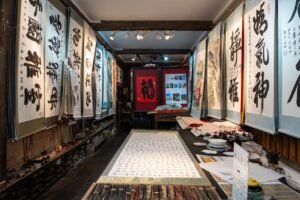Chinese literature has a long and rich history that dates back thousands of years. It is one of the oldest and most influential literary traditions in the world. The history of Chinese literature can be traced back to the Shang Dynasty (1600-1046 BCE), when the earliest known examples of Chinese writing were discovered on oracle bones. These inscriptions, which were used for divination purposes, provide valuable insights into the beliefs, customs, and daily life of the ancient Chinese.
Over the centuries, Chinese literature has evolved and flourished, encompassing a wide range of genres and styles. From classical poetry and historical records to novels and plays, Chinese literature reflects the diverse cultural, social, and political landscape of China. It has been shaped by various dynasties, philosophical schools, and literary movements, each leaving its mark on the literary tradition.
Chinese literature has had a profound impact on world literature. Its influence can be seen in the works of writers from different cultures and time periods. The themes and motifs found in Chinese literature, such as love, nature, and the pursuit of wisdom, are universal and resonate with readers around the world. Moreover, Chinese literature has provided valuable insights into Chinese history, culture, and society, allowing readers to gain a deeper understanding of China and its people.
Table of Contents
ToggleKey Takeaways
- Chinese literature has a rich history spanning thousands of years.
- Lu Xun is considered the father of modern Chinese literature and his works are still widely read today.
- Dream of the Red Chamber by Cao Xueqin is an all-time classic and a must-read for anyone interested in Chinese literature.
- Mo Yan’s controversial and groundbreaking works have earned him international recognition and awards.
- The Cultural Revolution had a significant impact on Chinese literature, as seen in the works of Bei Dao.
The Life and Works of 鲁迅Lu Xun: The Father of Modern Chinese Literature
Lu Xun鲁迅 is widely regarded as the father of modern Chinese literature. Born in 1881 in Shaoxing, Zhejiang province, Lu Xun鲁迅 played a pivotal role in shaping the course of modern Chinese literature through his writings and activism. He is best known for his short stories, which are characterized by their realism, social criticism, and psychological depth.
鲁迅Lu Xun’s works often depicted the harsh realities of life in early 20th century China, including poverty, corruption, and social inequality. His stories, such as “The True Story of Ah Q阿Q正传” and “Diary of a Madman狂人日记,” exposed the flaws and contradictions of Chinese society, challenging traditional values and beliefs. Through his writings, 鲁迅Lu Xun sought to awaken the Chinese people to the need for social and political change.
鲁迅Lu Xun’s impact on modern Chinese literature cannot be overstated. His works inspired a generation of writers and intellectuals, who followed in his footsteps and continued to explore themes of social criticism and political activism. 鲁迅Lu Xun’s legacy can be seen in the works of contemporary Chinese writers, who continue to grapple with the complexities of modern Chinese society.
The All-Time Classic: Dream of the Red Chamber by 曹雪芹Cao Xueqin
红楼梦Dream of the Red Chamber, also known as 石头记The Story of the Stone, is widely regarded as one of the greatest works of Chinese literature. Written by 曹雪芹Cao Xueqin in the 18th century during the Qing Dynasty, it is a sprawling novel that tells the story of the decline and fall of a noble family in Beijing.
The novel is renowned for its complex characters, intricate plot, and lyrical prose. It explores themes such as love, fate, and the transience of life, while also providing a vivid portrayal of 18th century Chinese society. 红楼梦Dream of the Red Chamber is not only a work of great literary merit, but also a valuable historical document that offers insights into the customs, traditions, and social hierarchy of imperial China.
The significance of 红楼梦Dream of the Red Chamber in Chinese literature cannot be overstated. It has had a profound influence on subsequent generations of writers and has been widely studied and analyzed by scholars. Its themes and characters continue to resonate with readers today, making it a timeless classic that stands as a testament to the enduring power of Chinese literature.
The Controversial and Groundbreaking Works of 莫言Mo Yan
莫言Mo Yan is one of the most controversial and groundbreaking writers in contemporary Chinese literature. Born in 1955 in Shandong province, 莫言Mo Yan rose to prominence in the 1980s with his novel 红高粱Red Sorghum, which was later adapted into a critically acclaimed film by director Zhang Yimou.
莫言Mo Yan’s works often explore themes of history, memory, and the human condition. He is known for his vivid storytelling, richly drawn characters, and dark humor. However, his works have also been criticized for their graphic violence and explicit sexual content. Despite the controversy surrounding his works, Mo Yan has been widely recognized for his literary achievements and was awarded the Nobel Prize in Literature in 2012.
莫言Mo Yan’s impact on Chinese literature is significant. His works have pushed the boundaries of what is considered acceptable in Chinese literature and have challenged traditional notions of literary form and content. Moreover, his success on the international stage has brought greater attention to contemporary Chinese literature and has helped to elevate the status of Chinese writers in the global literary community.
The Cultural Revolution and Its Impact on Chinese Literature: The Works of 北岛Bei Dao
The Cultural Revolution, which took place from 1966 to 1976, had a profound impact on Chinese literature. During this tumultuous period, many writers and intellectuals were persecuted or forced into silence. However, some writers managed to find ways to express themselves and capture the spirit of the times.
One such writer is 北岛Bei Dao, whose real name is 赵振开Zhao Zhenkai. Born in Beijing in 1949, 北岛Bei Dao emerged as a prominent voice during the Cultural Revolution with his poetry that expressed a sense of disillusionment and longing for freedom. His works often used metaphor and symbolism to convey his feelings of alienation and despair.
北岛Bei Dao’s impact on Chinese literature cannot be overstated. His poetry captured the spirit of a generation and provided a voice for those who were silenced during the Cultural Revolution. His works continue to be studied and celebrated for their artistic merit and their ability to convey the human experience in times of great turmoil.
The Female Voice in Chinese Literature: The Works of 张爱玲Eileen Chang
张爱玲Eileen Chang is one of the most celebrated female writers in Chinese literature. Born in Shanghai in 1920, Chang’s works often explore themes of love, desire, and the complexities of human relationships. Her writing is characterized by its lyrical prose, psychological insight, and keen observations of social mores.
Chang’s works often depict the struggles and aspirations of women in Chinese society. She was known for her strong female characters who defied societal expectations and sought to assert their independence. Her works, such as Love in a Fallen City and Lust, Caution, have been widely praised for their exploration of female desire and their nuanced portrayal of gender dynamics.
Chang’s significance in Chinese literature lies not only in her literary achievements, but also in her role as a trailblazer for female writers. She broke new ground by writing about taboo subjects and challenging traditional gender roles, paving the way for future generations of female writers to explore similar themes.
The Nobel Prize Winner: 高行健Gao Xingjian and His Works
高行健Gao Xingjian is the first Chinese writer to be awarded the Nobel Prize in Literature. Born in 1940 in Jiangxi province, Gao is known for his experimental style and his exploration of existential themes. His works often blur the boundaries between fiction and autobiography, reality and illusion.
Gao’s most famous work is 灵山Soul Mountain, a novel that combines travelogue, memoir, and fiction. The novel follows the protagonist’s journey through rural China as he grapples with questions of identity, spirituality, and the meaning of life. Gao’s works are characterized by their introspection, philosophical musings, and poetic language.
Gao’s impact on Chinese literature is significant. His experimental style and his willingness to challenge literary conventions have inspired a new generation of writers to push the boundaries of what is considered acceptable in Chinese literature. Moreover, his international recognition has helped to raise the profile of Chinese literature on the global stage.
The Historical Fiction of 金庸Jin Yong: The Swordsman Series
金庸Jin Yong, whose real name is 查良镛Louis Cha, is one of the most popular and influential writers in Chinese literature. Born in 1924 in Zhejiang province, Jin Yong is known for his historical fiction novels, particularly The Swordsman Series, which consists of 14 novels set in the martial arts world of ancient China.
Jin Yong’s novels are characterized by their intricate plots, colorful characters, and detailed descriptions of martial arts techniques. His works often explore themes such as loyalty, honor, and the pursuit of justice. Jin Yong’s novels have been widely read and loved by generations of readers, and have been adapted into numerous films, TV series, and video games.
The significance of Jin Yong’s works in Chinese literature cannot be overstated. His novels have not only entertained millions of readers, but have also shaped popular culture and influenced subsequent generations of writers. Jin Yong’s ability to create vivid and compelling characters and his skillful storytelling have made him a beloved figure in Chinese literature.
The Modern Chinese Diaspora: The Works of 谭恩美Amy Tan
谭恩美Amy Tan is a prominent writer in the modern Chinese diaspora. Born in 1952 in Oakland, California, Tan explores themes of identity, family, and cultural heritage in her works. Her novels often depict the experiences of Chinese immigrants and their descendants as they navigate the complexities of living between two cultures.
Tan’s most famous work is 喜福会The Joy Luck Club, a novel that tells the stories of four Chinese immigrant women and their American-born daughters. The novel explores themes such as mother-daughter relationships, the search for identity, and the power of storytelling. Tan’s works have been widely praised for their emotional depth, vivid characters, and lyrical prose.
Tan’s significance in Chinese literature lies in her ability to give voice to the experiences of Chinese immigrants and their descendants. Her works have helped to shed light on the challenges and triumphs of the Chinese diaspora, and have provided a platform for dialogue and understanding between different cultures.
The Contemporary Chinese Literature Scene and Emerging Authors to Watch
The contemporary Chinese literature scene is vibrant and diverse, with a new generation of writers emerging to explore a wide range of themes and styles. These emerging authors are pushing the boundaries of what is considered traditional Chinese literature and are experimenting with new forms and genres.
One such author is 薛欣然Xue Xinran, whose works often focus on the experiences of women in Chinese society. Her novels, such as 中国好女人们The Good Women of China and 天葬Sky Burial, provide a powerful exploration of gender dynamics, social injustice, and the resilience of the human spirit.
These emerging authors represent the future of Chinese literature. Their works are pushing the boundaries of what is considered traditional Chinese literature and are providing fresh perspectives on contemporary China. As they continue to gain recognition both within China and internationally, they have the potential to make a significant impact on Chinese literature.
Chinese literature has a long and rich history that has had a profound impact on world literature. From ancient texts to contemporary works, Chinese literature reflects the diverse cultural, social, and political landscape of China. It has provided valuable insights into Chinese history, culture, and society, and has helped to foster a greater understanding between different cultures.
The works of 鲁迅Lu Xun, 曹雪芹Cao Xueqin, 莫言Mo Yan, 北岛Bei Dao, 张爱玲Eileen Chang, 高行健Gao Xingjian, 金庸Jin Yong, 谭恩美Amy Tan, and many others have shaped the course of Chinese literature and have left a lasting impact on readers around the world. These writers have explored a wide range of themes and styles, pushing the boundaries of what is considered acceptable in Chinese literature and challenging traditional notions of literary form and content.
The contemporary Chinese literature scene is vibrant and diverse, with emerging authors like Yan Ge and Xue Xinran pushing the boundaries of what is considered traditional Chinese literature. As these authors continue to gain recognition both within China and internationally, they have the potential to make a significant impact on Chinese literature and to further enrich the global literary landscape.
Contact our head teacher, Chen Huimin, at info@lcchineseschool.com if you want to learn Chinese or have additional questions about our Chinese programs.
Sign up for a free trial class here.
Learn about our Internship Program in China.
Get free Chinese learning resources.
Learn about China’s 2024 Offical Holiday Schedule








